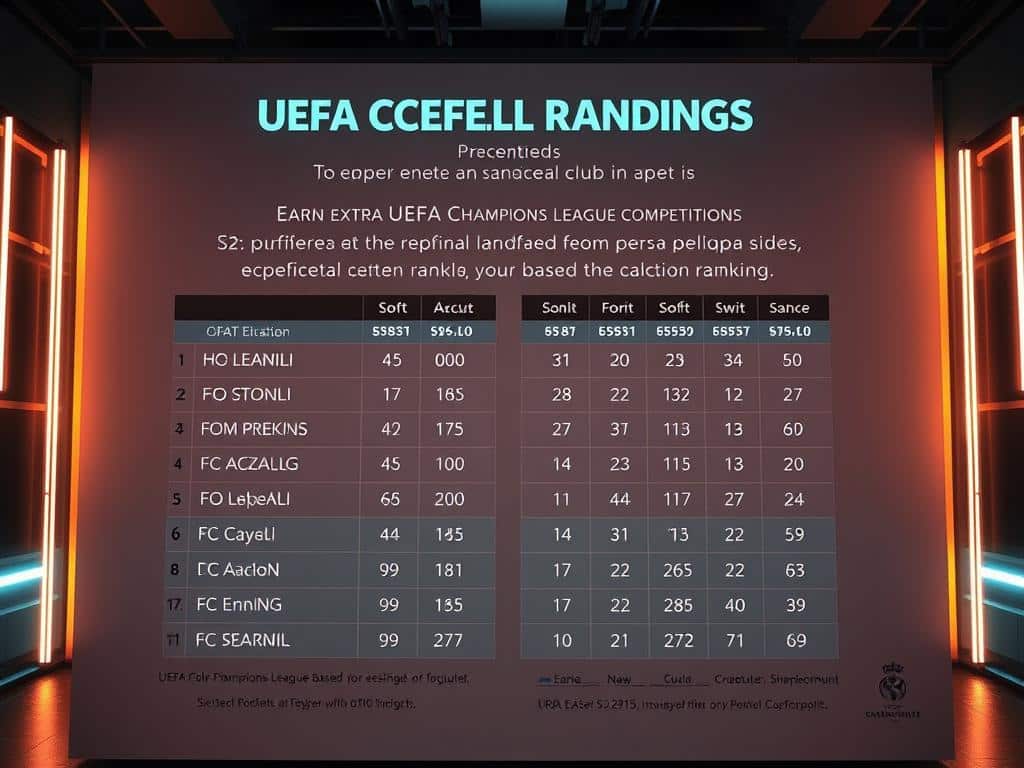Dreaming of seeing your favorite club compete in Europe’s elite football competitions? The road to the UEFA Champions League, Europa League, or Conference League is packed with excitement and strategy. Whether it’s through league standings, cup wins, or coefficient rankings, every match counts.
This season, the Premier League made history by securing a fifth Champions League spot. Teams like Manchester City proved that multiple pathways exist—dominating the league while also lifting the FA Cup. Success hinges on consistency, ambition, and seizing every opportunity.
Ready to explore how clubs earn their place among Europe’s best? Let’s break down the thrilling journey to UEFA glory.
How to Qualify for UEFA Tournaments: The Basics
Every season, teams chase glory in three prestigious UEFA tournaments. Each offers unique challenges and rewards, from the global spotlight of the UEFA Champions League to the underdog stories of the Conference League. Let’s unpack how clubs secure their spots.
Three Tiers of European Football
The Champions League is the pinnacle, reserved for the best. Top-four finishes in leagues like the Premier League guarantee entry. For example, Arsenal’s 2023 campaign secured their place among Europe’s elite.
Next, the Europa League welcomes fifth-place finishers or FA Cup winners. Crystal Palace’s 2024 cup run exemplifies this route. It’s a second chance for clubs to prove their mettle.
The Conference League, UEFA’s newest event, rewards EFL Cup victors. Newcastle’s 2024 triumph opened doors to continental competition, showcasing how smaller trophies create big opportunities.
League Dominance or Cup Magic?
Manchester City’s 2023 double—winning the Premier League and FA Cup—showcased dual qualification paths. Their league title secured a Champions League berth, while the cup win would’ve granted Europa League access if needed.
- Direct routes: Chelsea’s 2024 Conference League bid via EFL Cup victory.
- Backdoor entries: If cup winners already qualify (like Man City), the Europa spot goes to the next-highest league finisher.
Whether through consistency or cup heroics, the road to UEFA events is as thrilling as the games themselves.
Premier League Teams: UEFA Qualification Explained
The battle for European spots in the Premier League is fiercer than ever. With five Champions League places up for grabs, clubs fight tooth and nail for a shot at glory. Let’s dive into how England’s elite secure their continental tickets.
Champions League Spots: Top Four and Beyond
Finishing in the top five now guarantees a Champions League berth. Liverpool’s 2024 campaign locked them into fourth, while Aston Villa’s surge earned fifth. This expansion rewards consistency across Europe’s toughest league.
But there’s a twist. If English teams excel in UEFA events, an extra spot opens via the coefficient system. That’s why Newcastle’s top-five finish mattered—it shifted the Conference League slot downward.

Europa League and Conference League Criteria
Sixth place secures Europa League entry, unless the FA Cup winner hasn’t already qualified. Manchester United’s 2024 cup win handed them a direct pass, bumping seventh-place Brighton to the Conference League.
Winning the EFL Cup also grants a Conference League berth. Chelsea’s 2024 triumph meant even eighth place could become a golden ticket. Here’s the breakdown:
- Top five: Champions League dreams realized.
- Sixth + FA Cup: Europa League awaits.
- EFL Cup win: Conference League adventure begins.
Every match reshapes the table. Whether it’s a last-minute goal or a cup upset, the race for Europe never sleeps.
European Performance Spots: Earning an Extra UCL Place
Arsenal’s 2024 UCL run didn’t just make history—it reshaped England’s European landscape. Their deep campaign helped the Premier League secure an extra Champions League spot, proving that success abroad lifts everyone at home.

How Association Club Coefficients Work
UEFA’s coefficient system rewards leagues for consistent performance. Points are earned when clubs win matches or advance in European competitions. The total is divided by the number of teams, creating a league-wide average.
In 2024, Arsenal’s wins piled up points, pushing England’s ranking past rivals like Germany’s Bundesliga. This math isn’t just trivia—it’s why fifth place now means a Champions League dream.
Impact on Premier League’s Fifth-Place Team
That extra spot creates a domino effect. Fifth place now guarantees UCL football, shifting Europa League access to sixth. Teams like Aston Villa, who once missed out, now celebrate continental adventures.
Here’s the breakdown:
- Coefficient heroes: Clubs like Arsenal boost the entire league’s chances.
- Top-five thrill: More teams chase elite football, raising the stakes.
- Global ripple: Bundesliga and Serie A now chase England’s success.
Every match matters. Whether it’s a league final or a group-stage clash, Premier League clubs know: Europe is watching.
Cup Wins and Their Role in UEFA Qualification
Lifting a domestic trophy isn’t just about glory—it’s a golden ticket to Europe. For clubs outside the top five, the FA Cup or EFL Cup can be their passport to continental competitions. One magical run can change everything.
FA Cup and EFL Cup Winners: Automatic Berths
Win the FA Cup, and you’re headed to the league Europa. Crystal Palace’s 2024 triumph proved this—their underdog story earned a European tour. Similarly, the EFL Cup winners (like Chelsea in 2024) grab a Conference League spot.
These routes matter for mid-table teams. Wigan’s 2013 FA Cup shocker handed them Europa football, despite relegation. Cups reward boldness, not just league consistency.
What Happens If Cup Winners Already Qualify?
Sometimes, winners like Manchester City are already qualified for the Champions League. Their FA Cup win then passes the Europa spot to the next-highest league finisher. In 2024, this bumped seventh-place Brighton into Europe.
Here’s how it works:
- Double qualifiers: If a team wins a cup and finishes top five, their Europa slot goes to sixth place.
- EFL Cup twist: Chelsea’s 2024 win meant eighth place could snag a Conference League berth.
Every trophy lifts dreams. Whether it’s a giant like Real Madrid or a surprise hero, cups keep the drama alive.
Navigating the Road to UEFA Glory
The race for European football is full of twists. From Premier League drama to cup surprises, every match shapes a club’s destiny. Teams like Newcastle proved even mid-table squads can chase Champions League dreams.
This season, England’s success in UEFA events unlocked an extra spot. That means more clubs can taste elite competition. Imagine the thrill—10 teams possibly representing the league across three tournaments.
Wembley’s 2024 UCL final adds another layer. Home advantage could boost English clubs, fueling the coefficient snowball effect. Strong performances now mean more opportunities later.
Key takeaways:
- Cup runs matter—ask Newcastle, who turned EFL Cup glory into a European adventure.
- Even ninth-place Brentford could sneak in if English teams dominate UEFA trophies.
- Every point counts. The battle for fifth could mean Europa League or Conference League football.
Ready for kickoff? The road to UEFA glory starts here.







